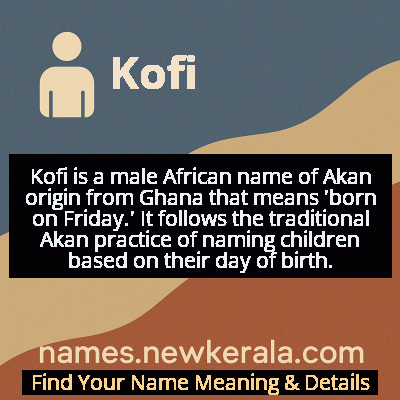Kofi Name Meaning & Details
Origin, Popularity, Numerology Analysis & Name Meaning of Kofi
Discover the origin, meaning, and cultural significance of the name KOFI. Delve into its historical roots and explore the lasting impact it has had on communities and traditions.
Name
Kofi
Gender
Male
Origin
African
Lucky Number
5
Meaning of the Name - Kofi
Kofi is a male African name of Akan origin from Ghana that means 'born on Friday.' It follows the traditional Akan practice of naming children based on their day of birth.
Kofi - Complete Numerology Analysis
Your Numerology Number
Based on Pythagorean Numerology System
Ruling Planet
Mercury
Positive Nature
Adventurous, dynamic, curious, and social.
Negative Traits
Restless, impatient, inconsistent, prone to indulgence.
Lucky Colours
Green, white.
Lucky Days
Wednesday.
Lucky Stones
Emerald.
Harmony Numbers
1, 3, 9.
Best Suited Professions
Sales, marketing, travel, entertainment.
What People Like About You
Versatility, charisma, adventurous spirit.
Famous People Named Kofi
Kofi Annan
Diplomat
Seventh UN Secretary-General and Nobel Peace Prize winner
Kofi Kingston
Professional Wrestler
Multiple-time WWE Champion and record-setting title holder
Kofi Abrefa Busia
Politician
Prime Minister of Ghana and prominent academic leader
Kofi Awoonor
Poet
Influential Ghanaian poet and literary figure
Name Variations & International Equivalents
Click on blue names to explore their detailed meanings. Gray names with will be available soon.
Cultural & Historical Significance
The name Kofi represents more than just a birth marker—it embodies the Akan philosophical concept of interconnectedness between time, identity, and destiny. This naming system has survived colonialism, modernization, and globalization, demonstrating the resilience of African cultural traditions. The name's continued popularity reflects the enduring importance of maintaining cultural identity while navigating contemporary global society, making it a symbol of cultural pride and heritage preservation. The international recognition of figures like Kofi Annan has further elevated the name's status as a representation of African excellence on the global stage.
Extended Personality Analysis
Individuals named Kofi are traditionally associated with specific personality traits rooted in Akan cultural beliefs about Friday-born children. They are often described as compassionate, diplomatic, and naturally inclined toward peacemaking and conflict resolution. These individuals typically exhibit strong leadership qualities combined with emotional intelligence, allowing them to navigate complex social situations with grace and wisdom. Their Friday birth is thought to endow them with artistic sensibilities and creative problem-solving abilities.
Kofis are believed to possess innate charisma and the ability to bring people together, making them natural community builders and mediators. They often demonstrate resilience in the face of challenges and maintain a balanced perspective even during difficult times. While these traits are culturally ascribed rather than scientifically proven, they reflect the Akan understanding of how temporal birth patterns might influence character development and life purpose. Many notable individuals bearing this name have indeed exemplified these qualities in their professional and personal lives, particularly in fields requiring diplomacy, leadership, and creative expression.
Modern Usage & Popularity
In contemporary times, Kofi remains a popular name throughout Ghana and among the African diaspora, maintaining its cultural significance while adapting to modern naming trends. The name has gained international recognition primarily through prominent figures like Kofi Annan, which has increased its visibility and acceptance in global contexts. While traditionally used within Akan communities, the name has crossed cultural boundaries and is now occasionally used by non-Akan parents who appreciate its melodic sound and cultural richness. In recent years, there's been a resurgence of interest in traditional African names as part of broader cultural reclamation movements, ensuring Kofi's continued relevance. The name maintains strong popularity in Ghana while also appearing in multicultural urban centers worldwide, particularly in Europe and North America where African diaspora communities actively preserve their naming traditions.
Symbolic & Spiritual Meanings
Symbolically, Kofi represents the concept of birth as both a temporal event and a spiritual assignment. The name embodies the Akan belief that the day of one's birth carries specific energies and purposes that shape one's destiny. As a Friday-born name, Kofi symbolizes Venus energy—associated with love, beauty, harmony, and reconciliation in many cultural systems. The name carries connotations of diplomacy, artistic expression, and the ability to bridge differences. In a broader metaphorical sense, Kofi represents the enduring strength of African cultural traditions in the face of globalization and the importance of maintaining ancestral connections. The name serves as a living testament to the sophistication of African philosophical systems and their understanding of human existence within cosmic patterns, while also symbolizing the potential for African cultural elements to achieve global recognition and respect.

